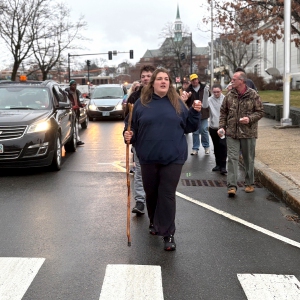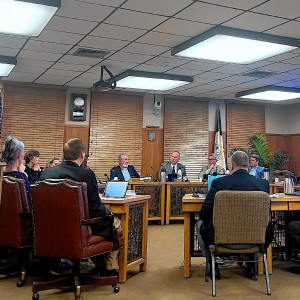Opinion: Medicare enrollment, seniors beware!

This Nov. 8, 2018 file photo shows a page from the 2019 U.S. Medicare Handbook in Washington. Pablo Martinez Monsivais / AP
| Published: 11-26-2024 6:00 AM |
Ahmed Kutty, MD lives in Peterborough.
A week ago, HS my 89-year-old neighbor asked for help to make sense of the calls and ads that were creating confusion and consternation to choose among various Medicare Advantage plans being pitched to her. My short answer was to stick with Traditional Medicare (TM). The long answer was to stay clear of Medicare Advantage (MA). Here is why.
Fall ushers in “open season” on our seniors who are bombarded on the airwaves for enrollment in Medicare Advantage programs offered by the various big healthcare insurance corporations, from Oct. 15 through Dec. 7 every year.
Traditional Medicare, since its inception in July 1965, has automatically enrolled all American seniors and the disabled with a near-perfect system for covering every eligible person after a brief verification process six months prior to the beneficiary’s sixty-fifth birthday, and enrollment carries lifetime validity.
MA, created by the Medicare Modernization Act of 2003, a private sector scheme selling supplemental insurance under Part C and often for drugs under D of Medicare, introduced the annual enrollment season. MA, unrelated to TM, was allowed under the act, use of the name for marketing to seniors who are or about to become TM beneficiaries.
The stated goals at the introduction of MA were to provide quality healthcare with cost savings than under TM, thus reducing the drain on Medicare Trust Fund employing market-based systems securing efficiencies from competition, deregulation and streamlining and from curbing of fraud, waste and abuse purportedly plaguing TM.
Twenty-one years on, MA is far from fulfilling its promise. MA costs $2,500 more per enrollee per year than under TM and depletes the Trust Fund of $88 billion annually by overcharging, deploying various strategies with borderline legality, documented by well-researched studies published in authoritative healthcare journals. On quality metrics, MA fared at best on par with TM, under rigorous analysis!
The premium quoted for an MA policy is based on individual underwriting with preexisting conditions raising costs. TM with no underwriting takes all comers: everybody in, nobody out! MA plans can drop enrollees while needing expensive care than at initial enrollment when healthy seniors are preferred: a practice known as “cherry picking.”
Article continues after...
Yesterday's Most Read Articles
 What to know about the plan to allow students to attend any public school in the state
What to know about the plan to allow students to attend any public school in the state
 ‘He went home’: Remembering Rodney Moody, ‘the mayor’ of Concord’s homeless community
‘He went home’: Remembering Rodney Moody, ‘the mayor’ of Concord’s homeless community
 Ethics complaint about Beaver Meadow Golf Course board handed off to Concord City Council
Ethics complaint about Beaver Meadow Golf Course board handed off to Concord City Council
 Opinion: Delivering terror by email
Opinion: Delivering terror by email
 A Franklin congregation loves its 19th-century home. Insurance woes could spell its decline.
A Franklin congregation loves its 19th-century home. Insurance woes could spell its decline.
Making the senior look sicker on paper, employing “diagnostic upcoding,” delaying care by resorting to burdensome “preauthorization” requirements, care denial often by AI-assisted algorithms and coverage denial for care from out-of-network clinicians or facility, including for emergent situations or if the necessary service was not available within the narrow-network offered by MA, are but a brief compilation of unsavory means employed by MA, dedicated to profit-maximization. Care may be accessed from any licensed practitioner and/or facility anywhere in the country under TM!
A 2024 affordability survey of 3,280 Medicare beneficiaries found 12% of MA folks facing issues resulting from deductibles and copays compared to TM’s 7%. 21% of MA patients found medical bills unaffordable versus TM’s 14%. Delays in accessing care were reported at 22% by MA enrollees compared to TM’s 13%, mostly attributable to preauthorization “boondoggle.”
However, among low-income people with dual eligibility for Medicare and Medicaid, MA did better than TM with respect to care delaying: 6% vs 10%. And this advantage held for availing vision and hearing services by this group. MA was found more affordable by beneficiaries unable to buy Medigap plans or ineligible by underwriting or because of preexisting conditions. Dental care was found unaffordable nearly equally by both groups even though coverage is available only under MA. Underwriting in MA makes the plans often unaffordable to the younger (under 65) disabled.
Once enrolled in MA getting out is cumbersome, as switching back to TM with a supplemental Medigap plan is virtually impossible because insurers are not required to accept them in most states. Bare TM coverage is often the only option open for elders needing more medical care for no fault of theirs.
Seniors should note that insurance corporations in the MA market are listed among the top 10 of the Fortune 500 companies. United Healthcare ranked #5, employing 90,000 doctors nationwide has a CEO who earned $23.5 million in 2023. In plain sight is the “profits over patients” motto.
Citizens must take action, petitioning Congress to rein in abusive practices and misbehaviors of the MA insurers. The money thus recouped may be repurposed for expanding services under an “Improved Traditional Medicare” and to assure the long-term solvency of the Trust Fund. Just saying no to Medicare (dis)Advantage is a power-tool readily available to every senior.







 Opinion: An attack on the legal profession is an attack on us all
Opinion: An attack on the legal profession is an attack on us all Opinion: HealthTrust's decision to drop anti-obesity medications is a step back in the fight against a chronic disease
Opinion: HealthTrust's decision to drop anti-obesity medications is a step back in the fight against a chronic disease Opinion: Courage and care count
Opinion: Courage and care count
